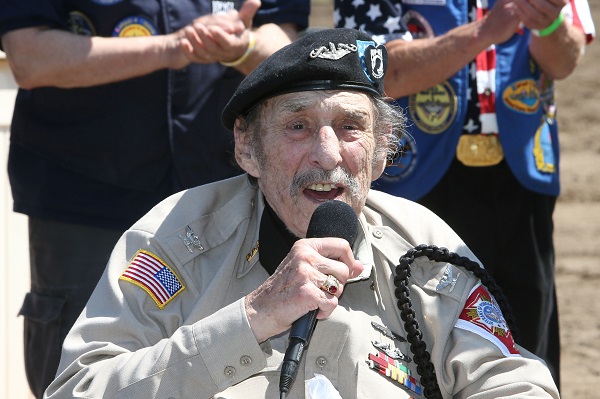BY JIM WELLS
It became evident during Muhammad Ali’s funeral two years ago that he was known in several areas of the world not as a prizefighter but for his humanitarian work, his willingness to reach out to the forgotten, marginal people on the planet. A man widely regarded as the greatest heavyweight champion of all time, yet many people, maybe most, in the world knew him for his support and outreach to the downtrodden.
There are echoes of that narrative in the life of Stan Kowalski, a man many people never knew as a professional wrestler but simply as a dedicated WW II veteran who would leave his home at any hour of the day to help a fellow veteran in need.
A Navy veteran of WW II who served as a gunner’s mate in three submarines in the Pacific, Kowalski dedicated his life after retirement from the ring to assisting the helpless and forgotten, in large and small ways.
A veteran’s water heater was out. He was still suffering the effects of PTSD after serving in Viet Nam and Kowalski was on the phone, maybe at 10 p.m., tracking down a plumber he met in McDonald’s the month before, then arranging help for the still suffering vet.
The shingles on another vet’s roof came off during a summer storm, a repair job he could no longer tackle because of wounds that destroyed the tissue in one of his legs while serving overseas, in a conflict at some godforsaken location no one can locate on a map.
Kowalski was on the phone, talking to a roofer he met at a VFW two years earlier.
Or, as happened several times, he arose at 3 a.m. and drove to Fort Ripley to see off soldiers headed for Afghanistan, Iraq or Kosovo, sending them to their destinations with encouragement or welcoming them back at various times with thanks for their service.
“He just felt that he needed to help veterans, especially those who were homeless,” said his daughter, Stacy Smith.
Kowalski was known to Canterbury Park fans for his visits to the track on Memorial Day each summer to lead festivities honoring veterans, namely those lost while serving the United States.
For the first time in more than a decade, he will not be here today, although his legacy is very much alive. A year ago, he attracted national attention in the racing industry for his interaction with jockey Jareth Loveberry, who lost a brother in the service a few years ago. Their story captured the hearts of veterans and racing fans.
Today, among those participating in activities is State Senator Jim Abeler, who assisted in making Kowalski’s dream come to fruition as the Anoka Eagles Nest, housing for veterans who are trying to make transitions in their lives. It is now operating.
Kowalski was fully aware that his dream would be fulfilled before dying last October at 91, although his legacy had long since been established, as a state commander of the VFW and as a tireless promoter of the United Way, an organization for which he gave hundreds of speeches and raised millions of dollars.
Kowalski’s son, Scott Smith, said his father got the idea of helping veterans more than 20 years ago. “In the late 1980s a homeless vet froze to death overnight. Dad didn’t go out for the next week without talking about that incident. ‘We’ve got homeless veterans who are sleeping and dying on park benches.’ ” he would say.
Smith,51, recalls the first time he saw his father wrestle, as if it were yesterday.
He was five years old and they were in Memphis, Tenn. “I got upset watching him getting hurt,” he recalled, “but he and his opponent talked me through it. I was in on it, one of the boys that night. He’d tell me to watch the next move after he got hit or his opponent would let me know that he wasn’t hurt.”
Smith said that selfish motives were a part of his fears that day. “Dad was taking me to the zoo the next day. I thought that if he got beat up we wouldn’t go,” he said.
Kowalski’s ring career over 28 years included an association with Tiny Mills, a Canadian wrestler. They were known as Murder Incorporated and won several world tag-team titles. Known as Killer Kowalski among other sobriquets, his long wrestling career included some 6,600 matches. He retired with shoulders and knees made primarily of titanium and, Scott said, having suffered “countless concussions.” Yet he remained coherent and alert to his last day.
Kowalski was 6-3 and weighed 280 pounds during the prime of his career, yet was nearly unrecognizable in that regard in his later years. He often made appearances in a wheelchair.
“He could still walk and get around,” Stacy said, “but he was a lot more comfortable doing it that way.”
Kowalski was born Bert Smith and changed his name for the wrestling ring, but his legal named remained Smith.
“Dad told us that if we ever needed anything to go by the name Kowalski,” Scott recalled. “Wrestling opened doors.”
And through many of those doors that opened walked a vet in need of shelter, medical assistance or simply a meal, doors that will continue to open either at the Eagles Nest or through another aspect of Kowalski’s legacy.
The Krusher in the ring was a man who sought to support and uplift lives outside of it.
